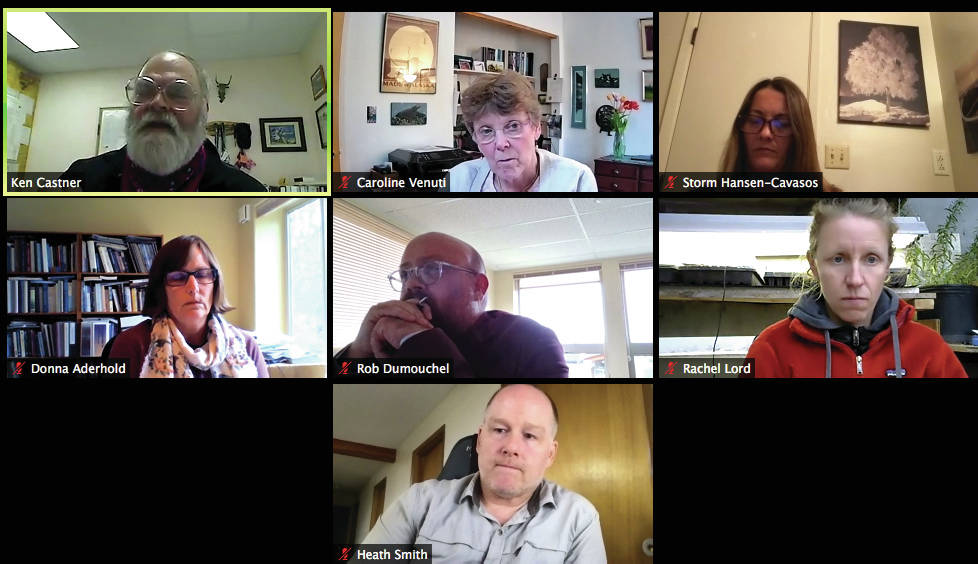A new ordinance sponsored by council members Heath Smith and Storm Hansen-Cavasos would change how city council members are elected. The ordinance was introduced Monday night at the Homer City Council regular meeting, and several community members showed support of the ordinance by calling into the Zoom meeting.
Ordinance 21-29, if adopted, would designate specific seats for which candidates would run and the percentage of votes required to earn the seat. Currently, two city council members are elected at large each year for three-year terms, with the top two candidates taking the seats.If adopted, the new ordinance would have candidates compete for two specific seats in each election cycle.
In a memorandum explaining why they proposed the change, Smith and Hansen-Cavasos wrote the ordinance was introduced to discourage voters from voting for only one candidate in the election cycle and provide an equal opportunity for candidates running for the two individual seats. For a candidate to be elected to office, they must receive the plurality of the vote, meaning 40% of the votes if less than five candidates run or 35% of the votes if five or more run.
“There is another element to this because I know that the electorate is one component and those that run to be elected is another. I really think that providing a choice to who they get to choose to run with in respect to not having to run against them is something that will actually increase participation,” Smith said. “In my mind, I think it improves our election process, and I’d like to see at the very minimum what may come out of it. I made the case … that every vote should carry the same value in respect to the seat that is being cast to fill. Under the current system, I don’t see that happening.”
Kenneth Bryant called into the Zoom to announce his support of the ordinance.
“The way things are set up, people’s votes aren’t counting toward what they really want or who they want,” Bryant said. “… I believe that changing the way that people’s votes are counted toward something will better suit them in getting what they actually want from their representatives.”
Mary Griswold, however, wrote to the council before the meeting to discuss her opposition to the ordinance. While she did want the ordinance to be introduced for further discussion, she wrote that she does not support the new voting legislation.
“I prefer our current method of voting for council members. Voting for designated seats would be more appropriate if the seats represented different districts of the city. We are not large enough to justify that,” Griswold wrote. “I like voting for my two top choices, especially when no incumbent is running. I would be frustrated if my two choices were running for the same seat under this ordinance.”
A public hearing for Ordinance 21-29 will be held at the upcoming city council meeting on June 14, with a second reading and consideration by the council.
Ordinance 21-31, an ordinance to remove the Homer water and sewer program funds from the special utility fund to create a new account, was substituted with Ordinance 21-31(S), which was introduced and will be available for public comment at the upcoming city council meeting June 14. The ordinance substitution will create a new fund consistent with existing revenue code and require quarterly reporting.
A public hearing concerning the Tasmania Court Water and Sewer Improvement Projects was also held during the meeting. Memorandum 21-085, written by Janette Keiser, director of public works and acting city engineer, states that more than 51% of property owners of lots where the sewer main extended objected to the new sewer district because of the high cost. The extension would allow property owners receiving city water service to also be added to the sewer line. The city is responsible for paying 25% of the cost of the extension while property owners are left with the remaining 75%.
Brian and Jenny Evans purchased a house in Homer in 2020 and were some of those objecting to the new district.
“The end cost to us is just not justified. It’s very expensive. Having the property owner pay 75% and the city pay 25%, it puts a large financial burden on us,” Brian Evans said. “While we understand that it would be beneficial for the city to do both the water and sewer improvements at the same time, we certainly just can’t justify the cost.”
Due to the property owners’ objections, the city has postponed the special assessment district to June 14, to allow for a neighborhood meeting in search of a solution.
In addition to the ordinances discussed during the regular meeting, the city council discussed the fiscal year 2022-23 budget draft in the Committee of the Whole and introduced it on the consent agenda at the regular meeting. The council did not receive the budget until the day of the meeting, leaving little time for proposed amendments or questions. The budget as proposed is very similar to the previous year’s budget, adding no new jobs, taxes or fees. However, the budget does present operating deficits, which will be balanced by transfers from the general fund, according to city manager Rob Dumouchel. While the budget is conservative, the city is hopeful the tourist season will supply a surplus of funds.
“We are in an advantageous position for this biennium,” Dumouchel said. “It’s just a very difficult time to make certain forecasts because of the worldwide nature of disruption gripping from COVID-19 pandemic.”
Two public hearings concerning the fiscal year 2022-23 budget will be held June 14 and June 28. The budget has a target adoption date of June 28.
The next meeting will be held via Zoom webinar on June 14. The meetings will resume in person at the City Hall Cowles Council Chambers once current renovations are concluded.
For more information about the meeting, visit https://www.cityofhomer-ak.gov/citycouncil/city-council-regular-meeting-248.
Reach Sarah Knapp at sarah.knapp@homernews.com


